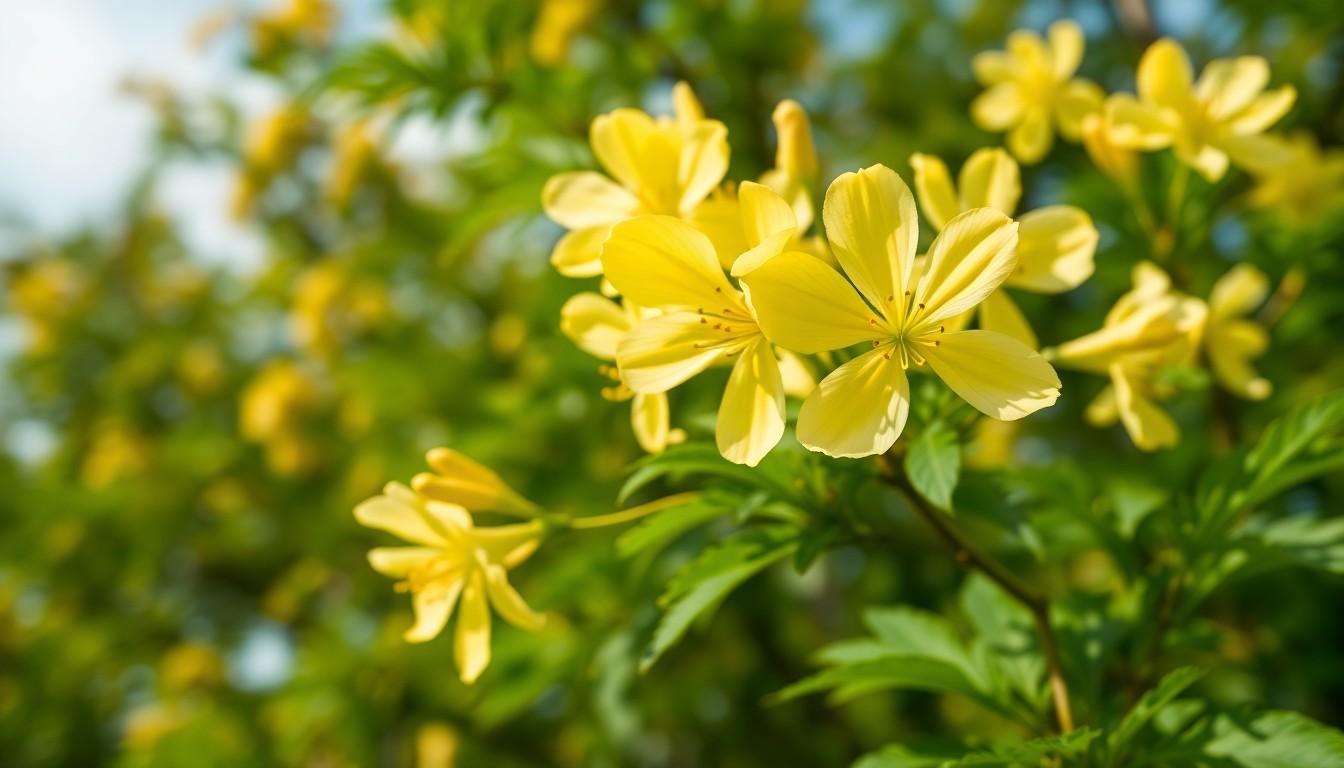The Best Fluffy Pancakes recipe you will fall in love with. Full of tips and tricks to help you make the best pancakes.

Linden Flowers: Unlock the Hidden Health Benefits for Relaxation and Wellness
Linden flowers might just be the best-kept secret in the world of herbal remedies. These tiny, fragrant blooms pack a punch when it comes to health benefits, making them a must-have in any wellness toolkit. Imagine sipping a warm cup of linden tea, feeling the stress of the day melt away like ice cream on a hot summer day. Who wouldn’t want that?
Overview of Linden Flowers
Linden flowers, known for their delicate yellow petals, belong to the Tilia genus. These flowers bloom in late spring to early summer, attracting pollinators like bees. Health benefits associated with linden flowers include their calming effects on the nervous system and potential to alleviate anxiety.
Scientific studies point to linden tea’s effectiveness in promoting better sleep and reducing inflammation. Antioxidants found in linden flowers contribute to overall health by combating oxidative stress.
In herbal medicine, linden is often used to treat colds and respiratory issues. Infusions made from dried linden flowers help soothe sore throats and clear mucus from the airways. Additionally, linden flowers contain flavonoids and essential oils that enhance their therapeutic properties.
Linden tea serves as a popular herbal remedy worldwide. Many enjoy its pleasant, mild flavor, making it a preferred choice for relaxation. The tea can be easily prepared by steeping dried flowers in hot water for several minutes.
Linden flowers are beneficial not only for their health advantages but also for their aromatic properties. They emit a sweet scent that can uplift moods and create a calming atmosphere in a space. This aroma contributes to their use in potpourri and essential oil production.
Awareness of linden flowers is growing in holistic communities. Increased interest highlights their versatile applications in wellness protocols across various settings. Recognizing their benefits in daily life fosters a deeper understanding of this underappreciated herbal ally.
Historical Significance

Linden flowers hold a rich history tied to traditional practices and cultural symbolism. Their usage spans centuries, reflecting profound herbal knowledge.
Traditional Uses
Ancient civilizations utilized linden flowers for various medicinal purposes. They made infusions to ease respiratory ailments and promote relaxation. Herbalists in Europe and North America often turned to linden for its calming qualities. Many indigenous cultures used it to treat fever and inflammation. Recipes for linden tea have persisted through generations, highlighting its popularity. The flowers play a vital role in herbal medicine, often featured in various remedies aimed at enhancing well-being.
Cultural Associations
Linden flowers often symbolize love and fidelity in numerous cultures. In Germany, they hold special significance, often appearing in wedding ceremonies. This flower has been prominent in folklore, associated with protection and nurturing. Various artworks depict linden trees as symbols of strength and endurance. In some traditions, the blossoms are linked to divine femininity, fostering connections to nature. Historical texts also mention linden trees as sacred, revered in different spiritual practices.
Health Benefits
Linden flowers offer a range of health benefits, making them a valuable addition to wellness routines.
Antioxidant Properties
Linden flowers contain high levels of antioxidants. These compounds fight oxidative stress, which can contribute to chronic diseases. A study published in the Journal of Ethnopharmacology highlighted linden’s potential to protect cells from damage caused by free radicals. Drinking linden tea often enhances one’s overall antioxidant intake, promoting better health. Additionally, antioxidants aid in reducing inflammation, further showcasing linden’s therapeutic potential. Including linden in the diet can support bodily defense systems against various illnesses.
Relaxation and Sleep Aid
Linden flowers promote relaxation and help with sleep difficulties. Known for their calming effects, they can soothe anxious feelings and facilitate tranquil evenings. Research indicates that linden tea may reduce sleep disturbances, contributing to improved sleep quality. People often report feeling more rested and rejuvenated after using linden as a bedtime ritual. Incorporating linden into a night routine can signal the body to wind down. Many individuals appreciate its gentle, sedative properties, making linden a preferred choice for relaxation.
Methods of Consumption
Linden flowers offer various methods for consumption, making them accessible in different forms. These methods allow individuals to explore the benefits of this herbal remedy while matching their preferences.
Herbal Teas
Preparing herbal teas serves as a popular way to enjoy linden flowers. The simple process involves steeping dried flowers in hot water for several minutes. Many people appreciate the soothing properties of linden tea, which promotes relaxation and better sleep. With its pleasant flavor, it appeals to both novice and experienced herbal tea drinkers. Consuming this infusion regularly may also aid in alleviating respiratory issues and reducing inflammation.
Tinctures and Extracts
Utilizing linden tinctures and extracts presents another effective consumption method. These concentrated forms of the herb retain the beneficial properties of the flowers through alcohol or glycerin extraction. Tinctures typically require a few drops taken under the tongue or mixed in beverages. High-quality extracts provide an easy way to incorporate linden’s calming effects into a daily routine. Many users find tinctures convenient for their potent effects, enhancing overall wellness without needing to brew tea.
Potential Side Effects and Considerations
Linden flowers, while widely appreciated, may cause side effects in some individuals. Allergic reactions to linden can occur, particularly in those sensitive to plants in the Tilia genus. Symptoms might range from skin irritation to respiratory distress.
Individuals taking certain medications must approach linden with caution. Since linden can affect blood pressure, those on antihypertensive drugs should monitor their response closely. It may also enhance the effects of sedatives and other calming medications, potentially leading to excessive drowsiness.
Pregnant and breastfeeding individuals should consult healthcare professionals prior to use. Insufficient research exists on the safety of linden flowers during these stages.
While linden tea is generally safe, excessive consumption can lead to gastrointestinal disturbances. Adjusting intake might alleviate symptoms of stomach upset.
Consulting a healthcare provider is advisable before starting linden for those with existing health conditions or multiple medications. Professionals can provide tailored advice based on an individual’s medical history.
Overall, recognizing the potential side effects and necessary precautions ensures a safe experience with linden flowers. Prioritizing safety aids in reaping the benefits while minimizing risks.
Conclusion
Linden flowers offer a wealth of benefits that extend beyond their charming appearance. Their calming properties and historical significance make them a valuable addition to any wellness routine. By embracing linden in forms like tea or tinctures, individuals can experience relaxation and improved sleep quality while enjoying a rich cultural heritage.
As awareness of natural remedies grows, linden flowers stand out as a versatile herbal ally. With their soothing effects and antioxidant-rich profile, they provide a unique way to enhance well-being. However, it’s essential to approach their use with mindfulness, considering any potential side effects. By doing so, one can fully appreciate the remarkable qualities of linden flowers and integrate them safely into daily life.
